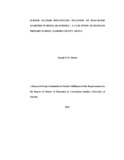| dc.description.abstract | This study aimed at establishing the school factors influencing the inclusion of
deaf-blind learners through a case study of Kilimani Primary School, Nairobi
County. The study specifically sought to establish the teachers’ and regular
learners’ attitudes towards deaf-blind learners, suitability of school physical
environment in support of inclusion of deaf-blind learners, and teachers’
professional qualifications to support deaf-blind learners.
The study used a case study design where both qualitative and quantitative data
were collected. Questionnaires, interview schedule and lesson observation guide
were used to collect data from the headtecher, teachers, regular learners and the
school physical facilities. The target population for the study consisted of the
headteacher, all the 20 teachers who teach in the class where the deaf-blind
learners are included were purposively sampled and 250 regular learners. In
addition, seven teachers teaching in the special unit were also purposively
sampled.
The findings indicate that majority of teachers, (81%) had positive attitudes as
shown by their appreciation of inclusion of deaf-blind learners in the regular
classroom. On whether regular learners are friendly to deaf-blind learners, the
findings showed that most of the regular learners, 88 percent, were in agreement
that they were friendly to deaf-blind learners, which is an indication of positive
attitude.
On whether teachers are willing to teach deaf-blind learners, the findings show
that 90 percent of the teachers were willing to teach deaf-blind learners in the
inclusive setting, however, 89 percent of the teachers indicated that they required
specialized training to enable them to implement inclusion of deaf-blind learners.
On teachers’ use of varied teaching/learning strategies to cater for deaf-blind
learners, 88 percent of the teachers indicated that they do not vary their
teaching/learning strategies. Teachers should use varied teaching/learning
strategies when teaching deaf-blind learners because their disabilities are not the
same. Majority of the teachers (85%) suggest that there is need to adapt the
curriculum to cater for the deaf-blind learners in an inclusive setting and 84
percent of the teachers indicate that the school has no enough teaching/learning
resources to cater for deaf-blind learners hence hindering inclusion. The
researcher also found that 89 percent of the regular learners support deaf-blind
learners and that 84 percent indicate that they interact freely with deaf-blind
learners, hence assign of acceptance and support to inclusion. 89 percent of the
regular learners indicated that they assist deaf-blind learners while 86 percent
indicate that deaf-blind learners take part in co-curriculum activities.
The study therefore concluded that there exists favourable attitude towards deafblind
learners among teachers and regular learners despite a small percentage
however still have a negative attitude. It is also evident that teachers lack
necessary skills to implement inclusion of deaf-blind learners. The research also
xv
found out that 98 percent the school physical environment does not support
inclusion of deaf-blind learners.
The study recommended further studies to be done on the other disabilities and
the Ministry of Education to urgently organize for in-service courses in every
county to equip teachers with skills of teaching deaf-blind learners in an inclusive
setting. The study also recommended that the Ministry of Education should give
study leave with pay to all practicing teachers who want to study special
education in all the levels as an incentive to encourage more teachers to join
special education. | en |

